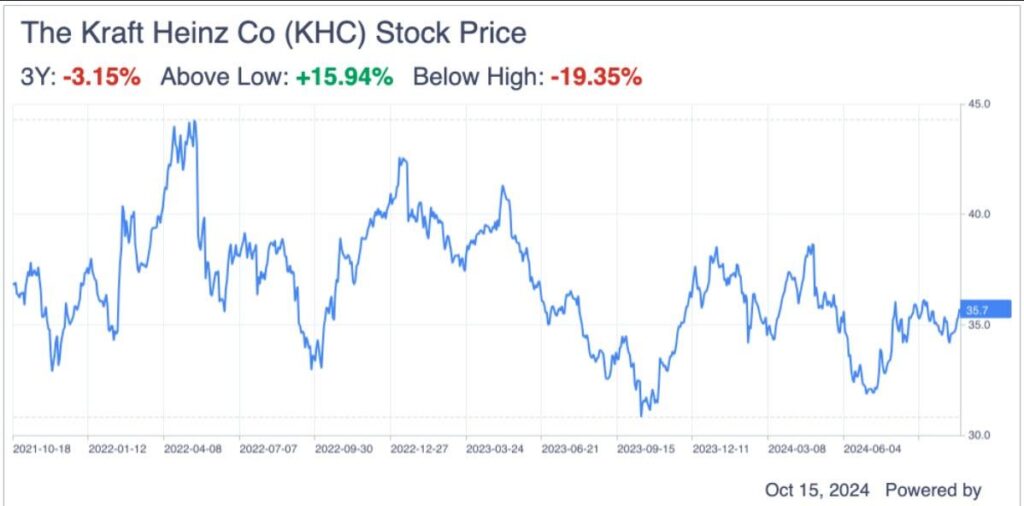Kraft Heinz’s stock performance has notably lagged behind the broader market in recent years, presenting a challenging investment for shareholders. Over the last three years, Kraft Heinz (KHC) has recorded a total return of approximately 8.3%, while the S&P 500 has soared by around 38%. Factors contributing to this underperformance include declining multipliers, worries surrounding the influence of GLP-1 weight loss drugs, and subdued operational performance. Nevertheless, Warren Buffett, the company’s largest shareholder through Berkshire Hathaway, continues to maintain his stake. He has been invested since the merger of Kraft and H.J. Heinz in 2015, illustrating his confidence in the brand despite the stock’s struggles.
The Kraft Heinz Company is a major player within the global food and beverage sector, with household names such as Heinz, Kraft, and Jell-O under its umbrella. Despite the competitive landscape, which includes rivals like Conagra and General Mills, Kraft Heinz has managed consistent profitability over the years. The company generates about 70% of its revenue from the U.S., with a significant portion coming from key international markets like Canada and the U.K. Interestingly, condiments account for roughly one-third of its total revenue. Walmart stands as the company’s largest customer, illustrating the importance of retail relationships in its sales strategy.
Warren Buffett’s backing of Kraft Heinz has remained steadfast, even as the investment has struggled. Initially, Berkshire Hathaway acquired shares when Heinz was taken private in 2013, later increasing its stake during the merger with Kraft Foods. Despite admitting he overpaid for his holdings, Buffett is still attracted to Kraft Heinz’s portfolio, viewing it as a collection of robust brands. His decision to retain shares, including during a period when Berkshire significantly downsized its public equity investments, underscores his belief in the company’s long-term potential.
In response to its recent challenges, Kraft Heinz has adopted a new strategy emphasizing efficient and profitable growth over aggressive expansion. The company made a leadership change with the appointment of a new CEO in early 2024 and has prioritized improving margins. Recent data indicates a positive trend, with gross profit margins expanding by 190 basis points year-to-date. The focus on profitability has not precluded ongoing investments in brand support, as seen by increased spending on selling, general, and administrative expenses. Additionally, the company is diversifying its distribution channels, capitalizing on consumer preferences for value, especially during economic uncertainty.
The valuation of Kraft Heinz shares presents a compelling argument for potential recovery. Currently, the stock is trading at 11.4 times consensus FY 2024 earnings, significantly below the S&P 500’s average multiple of approximately 23.5. While Kraft Heinz has less growth potential than the broader market, its earnings volatility is also lower, suggesting the possibility of a valuation premium. Notably, a comparative analysis with close peers such as Conagra and Mondelez reveals that Kraft Heinz trades at a substantial discount, despite similar growth forecasts. Moreover, the company’s dividend yield of 4.5% is attractive in comparison to that of its competitors, further enhancing investment appeal.
Nevertheless, risks persist for Kraft Heinz, primarily stemming from its highly leveraged balance sheet, which carries a net leverage ratio of 3.1 times—close to its target of 3 times. This high leverage limits the company’s ability to navigate significant business challenges and could become more burdensome with rising interest rates. The possibility of an inflationary environment also poses threats, as increasing input costs may squeeze profit margins and push consumers toward cheaper private-label alternatives. These factors necessitate careful consideration of the company’s financial health and market strategy moving forward.
In conclusion, while Kraft Heinz has faced recent headwinds resulting in disappointing stock performance, it currently presents a promising investment opportunity characterized by attractive valuation metrics. Warren Buffett’s unwavering confidence offers further credence to this position. With an updated focus on driving profitable growth and increasing operational efficiency, alongside promising expansion in emerging markets and effective distribution channel development, Kraft Heinz appears poised for potential earnings recovery. Ultimately, its significant valuation discount relative to peer companies and historical norms, coupled with ongoing stock repurchase efforts, position Kraft Heinz as a compelling contender in the value investment space.

